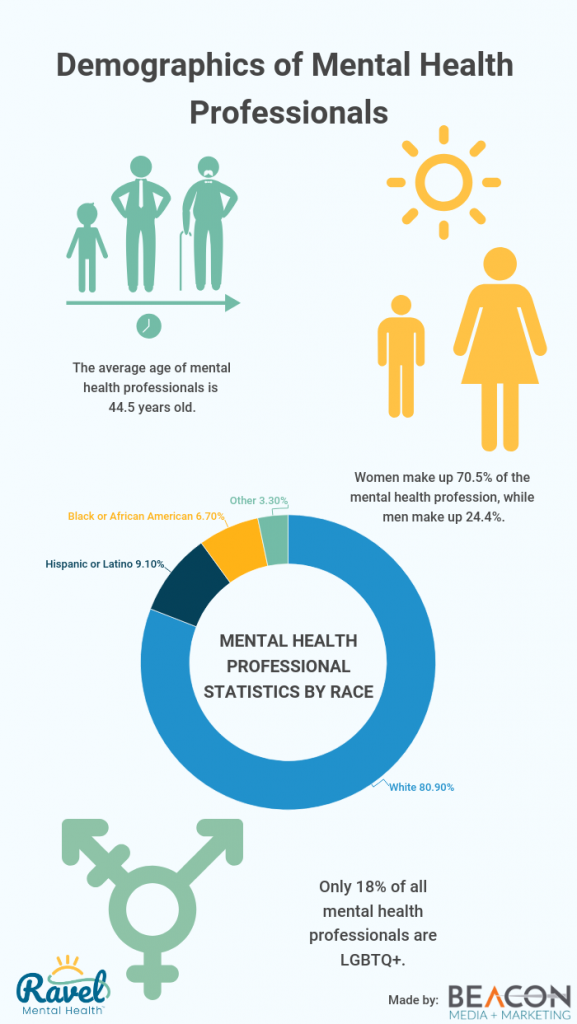Finding the right therapist is one of the biggest challenges for people. While they’re in their session, they want to feel comfortable and supported while talking about what they’re facing in life.
To better understand your clients, you should practice using a culturally sensitive therapy approach. Many clients want to feel like they’re understood. Acknowledging their culture and life experiences can be beneficial to treat them. It is crucial to have a therapist who understands how their life experiences have shaped them.
So, with the rise of culturally sensitive therapy, how can you better help BIPOC clients? In this blog, we’ll address what taking a culturally sensitive approach looks like and why it’s crucial for treating your patients, particularly BIPOC clients.
Do you want to connect to BIPOC clients? Sign up for Ravel Mental Health today.
What Is Culturally Sensitive Therapy?
Culturally sensitive therapy emphasizes the understanding of how a client’s background, ethnicity, and belief system affect them. Some therapists may primarily focus on the trauma of their patients and ignore how their client’s race and cultural background affects them. It’s essential not to ignore their race but rather acknowledge it and how it’s played a role in their life.
This makes it easier for therapists to understand where their client is coming from. It allows you to accommodate and respect differences in opinions, values, and attitudes towards cultures and different types of people. By practicing cultural sensitivity, you’ll gain and maintain cultural competency, which is the ability to recognize and understand one’s own culture and how it influences one’s relationship with a client.
Addressing your attributes is essential to understanding how you see the world differently than your patient. Some characteristics can easily change how you and your patient connect, including:
- Age
- Beliefs
- Ethnicity
- Race
- Gender
- Religion
- Disabilities
- Sexual orientation
- Socioeconomic status
How Does Culturally Sensitive Therapy Work?
Advocates for this approach believe that culturally sensitive therapy is crucial to better understanding your patient and how to help them. Although therapists who practice cultural sensitivity may deviate from standard therapeutic methods, they still adhere to their profession’s ethical guidelines.
While some therapists believe that highlighting one’s differences is offensive and damaging to a therapeutic relationship, it is generally believed that showing respect for one’s race and culture is a more effective treatment. The client and therapist may have positive experiences sharing their similarities and differences. Practicing cultural competency is a great way to connect with your client in a new way.
This is an excellent time to understand how this affects their worldview and any trauma they may have experienced when addressing their racial background. This may also shape their goals and progress. A therapist who has successfully integrated cultural sensitivity practices into their treatment recognizes and respects differences and communicates successfully with clients from diverse backgrounds.

Why It’s Important to Provide Therapy for BIPOC
Many BIPOC struggle to find the right therapist for them because of the demographics of mental health professionals.
- 70.5% of all mental health professionals are women, and only 24.4% are men.
- The average age is 44 years old.
- The most common ethnicity of providers is White (80.9%), followed by Hispanic or Latino (9.1%), and Black or African American (6.7%).
- Only 18% of all mental health professionals are LGBTQ+.
With many mental health professionals being older, white, and straight, finding providers for BIPOC is harder. This clientele wants to feel understood, so finding someone that matches their demographic can help them feel more comfortable or heard.
Treatment can be affected if clients don’t feel like they’re being understood. This can lead them to drop out early and not feel like they formed a healthy therapeutic alliance. Therapists who don’t practice cultural sensitivity may also take the wrong approaches to treatment, which should be tailored to the client’s culture and other needs.
Want to gain more BIPOC clients? Sign up for Ravel Mental Health today!
Tips on How to Be Culturally Sensitive
While addressing a client’s background, race, and culture is an excellent place to start, more methods should be taken to address their possible trauma and treatment plan. Here are a few tips for becoming a more culturally sensitive therapist.
1. Be Mindful That Not All Clients Are the Same
A practice that can be beneficial for the client is remembering that not every treatment will work the same for everyone. It’s essential to be cognizant of your client’s social identities that make them unique. It would help if you practiced appreciating their differences and approached clients with an understanding and respect for their cultural values.
You should be open to respecting a client’s needs so you can better assist them. If you are open-minded and recognize the multitude of ways to view the world, you’ll be better at making your clients feel understood and valued.
2. Recognize If Your Social Identities Hinder Your Ability to Help
There may be times when you can’t fully understand your client’s frustrations or worldview. Although you are there to help guide them, there may be times when your views may hinder the connection between you and your client.
Consider how your values, worldviews, and upbringing affect how you influence your client’s perceptions or trust with you. Keep in mind how their behaviors or decisions may be guided by their cultural values or beliefs.
3. Don’t Forget to Self Reflect
Understanding how you talk to your patient and how they take it is a big part of staying on the right treatment path. You should ask yourself if you’re tolerable, inclusive, or integrative. Asking yourself this regularly will make sure that you’re not giving your patient a negative therapy experience and that you’re helping them.
Tolerance is acknowledging the difference between you and your client. Inclusivity means that you’re asking them about their social identities and cultural background so you can consider them in your conceptualization. Then integration uses tolerance and inclusivity in their treatment, which is the goal.
4. Accept Outside World Influence
A lot is going on in the outside world. Make sure that you’re opening the door for your client to talk about specific topics such as racism, police brutality, and more. Ask them how they’re feeling with everything going on.
You can open the door by talking about something happening in the news or on social media. It doesn’t need to be the key focus of the therapy session but acknowledging it will help you understand why they may be feeling a certain way and how to possibly help them during the difficult time.
5. Don’t Make Focused Assumptions
It can sometimes be easy to jump to conclusions about why your client feels a certain way. Sometimes their appearance or not wanting to talk about specific topics can make you assume why they’re feeling certain ways.
For example, some BIPOC clients may be more focused on financial troubles or personal grief than racism. It doesn’t mean that racism may not be important to them. It may just mean that it’s not affecting them during that session. However, acknowledging their race or the racism they face is still essential.
Ravel Mental Health Can Help BIPOC Clients
At Ravel Mental Health, we work towards connecting the patients to you. Since so many BIPOC face struggles in finding the right mental health professional, we make it easier.
Ravel Mental Health can help you streamline your processes and connect with more clients who are a good fit for your culturally sensitive practice. Clients can even look at your availability using our online platform and schedule an appointment themselves. You’ll be able to accept their booking with one click, so it’s easy for everyone.
With all the time you’ll save not handling the small details of running your practice, you can focus your energy on effectively practicing culturally sensitive therapy.
We can help the underserved BIPOC population together. Sign up for Ravel Mental Health today!
